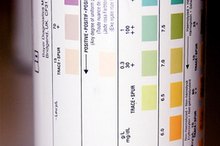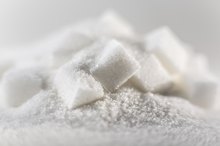What does fact checked mean?
At Healthfully, we strive to deliver objective content that is accurate and up-to-date. Our team periodically reviews articles in order to ensure content quality. The sources cited below consist of evidence from peer-reviewed journals, prominent medical organizations, academic associations, and government data.
The information contained on this site is for informational purposes only, and should not be used as a substitute for the advice of a professional health care provider. Please check with the appropriate physician regarding health questions and concerns. Although we strive to deliver accurate and up-to-date information, no guarantee to that effect is made.
How Do Sugars Affect a Person's Urine pH?
Urine pH is a measurement of your urine’s relative acidity 1. Your doctor may need to check your urine acidity if you need to take certain medications or have known risks for the formation of kidney stones. Normally, sugars in your body don’t directly affect your urine pH 1. However, in certain circumstances, your sugar glucose can show up during the same procedure used to check urine pH levels 1.
The Basics
Doctors check urine pH with a procedure called a dipstick test, which places fresh urine in contact with a plastic stick coated in strips of specially formulated chemicals 12. These chemicals trigger detectable changes that vary according to the qualities of your urine. Human urine can fall anywhere from 4.5 to 8 on the pH scale, which extends from a highly acidic reading of zero to a highly alkaline reading of 14 1. However, in most cases, the pH of human urine is a moderately acidic 5.5 to 6.5 1.
Dietary Influences
What Is Plus 4 in Glucose Levels?
Learn More
There are several dietary factors that can influence your urine pH 1. For instance, high intake of vegetables, dairy products or citrus fruits can make your urine less acidic and raise your pH levels 1. On the other hand, high intake of cranberries or various forms of meat can make your urine more acidic and lower your pH levels 1. In advance of a urine pH test, your doctor may ask you to eat a diet that balances acidic and alkaline foods 1. This will minimize medically unimportant changes in your pH level and allow your doctor to detect changes that could have potential health implications.
Sugar in Urine
When you consume sugar or other carbohydrate foods, your body breaks them down and passes a simple sugar called glucose into your bloodstream. Normally, a hormone from your pancreas gland called insulin lets your body manage this glucose and deliver it to your cells, where it acts as a fuel source. However, if you have the glucose control disorder called diabetes, glucose can accumulate abnormally in your bloodstream and pass through your kidneys into your urine. In addition to diabetes, conditions or circumstances that can lead to glucose in your urine include pregnancy, liver disease, hormone disorders and the use of certain medications.
- When you consume sugar or other carbohydrate foods, your body breaks them down and passes a simple sugar called glucose into your bloodstream.
- However, if you have the glucose control disorder called diabetes, glucose can accumulate abnormally in your bloodstream and pass through your kidneys into your urine.
Considerations
Foods Containing Glucose or Fructose
Learn More
Doctors don’t use pH readings to detect glucose in your urine 1. Rather, the sticks used to test pH levels also contain chemicals that can detect the presence of glucose. Additional readings taken from these sticks include the particle concentration in your urine, the levels of protein in your urine, the presence or absence of diabetes-related chemicals called ketones, and the presence or absence of a red blood cell byproduct called bilirubin. Consult your doctor for more information on urine pH testing and the effects of sugars inside your body 1.
Related Articles
References
- MedlinePlus: Urine pH
- Patient.co.uk: Urine Dipstick Analysis
- Lab Tests Online: Urinalysis -- The Chemical Examination
- Colorado State University; Physiologic Effects of Insulin; R. Bowen
- Perrier ET, Johnson EC, McKenzie AL, Ellis LA, Armstrong LE. Urine colour change as an indicator of change in daily water intake: a quantitative analysis. Eur J Nutr. 2016;55(5):1943–1949. doi:10.1007/s00394-015-1010-2
- Cortes-Penfield NW, Trautner BW, Jump RLP. Urinary Tract Infection and Asymptomatic Bacteriuria in Older Adults. Infect Dis Clin North Am. 2017;31(4):673–688. doi:10.1016/j.idc.2017.07.002
- Dreger NM, Degener S, Ahmad-Nejad P, Wöbker G, Roth S. Urosepsis--Etiology, Diagnosis, and Treatment. Dtsch Arztebl Int. 2015;112(49):837–848. doi:10.3238/arztebl.2015.0837
- Jump RL, Crnich CJ, Nace DA. Cloudy, Foul-Smelling Urine Not a Criteria for Diagnosis of Urinary Tract Infection in Older Adults. J Am Med Dir Assoc. 2016;17(8):754. doi:10.1016/j.jamda.2016.04.009
- Kang KK, Choi JR, Song JY, et al. Clinical significance of subjective foamy urine. Chonnam Med J. 2012;48(3):164–168. doi:10.4068/cmj.2012.48.3.164
- Blackburn PR, Gass JM, Vairo FPE, et al. Maple syrup urine disease: mechanisms and management. Appl Clin Genet. 2017;10:57–66. Published 2017 Sep 6. doi:10.2147/TACG.S125962
- Prakash S, Saini S, Mullick P, Pawar M. Green urine: A cause for concern?. J Anaesthesiol Clin Pharmacol. 2017;33(1):128–130. doi:10.4103/0970-9185.202190
- Torres PA, Helmstetter JA, Kaye AM, Kaye AD. Rhabdomyolysis: pathogenesis, diagnosis, and treatment. Ochsner J. 2015;15(1):58–69. PMID: 25829882
- Rehfuss A, Mahon J, Sorokin I, Smith C, Stein BS. Phenazopyridine: A Preoperative Way to Identify Ureteral Orifices. Urology. 2018;115:36-38. doi:10.1016/j.urology.2018.02.023
- American Urological Association. Diagnosis, Evaluation and Follow-up of Asymptomatic Microhematuria (AMH) in Adults. 2016.
- Worku DA. Purple urine bag syndrome: An unusual but important manifestation of urinary tract infection. Case report and literature review. SAGE Open Med Case Rep. 2019;7:2050313X18823105. Published 2019 Jan 12. doi:10.1177/2050313X18823105
- Alkaptonuria. National Institutes of Health. Genetic and Rare Diseases Information Center. 3/18/2016
- Seo JW, Lee JH, Son IS, et al. Acute oxalate nephropathy caused by ethylene glycol poisoning. Kidney Res Clin Pract. 2012;31(4):249–252. doi:10.1016/j.krcp.2012.09.007
- Urinalysis. Visual Examination. Lab Tests Online. https://labtestsonline.org/understanding/analytes/urinalysis/ui-exams
Writer Bio
M. Gideon Hoyle is a writer living outside of Houston. Previously, he produced brochures and a wide variety of other materials for a nonprofit educational foundation. He now specializes in topics related to health, exercise and nutrition, publishing for various websites.









